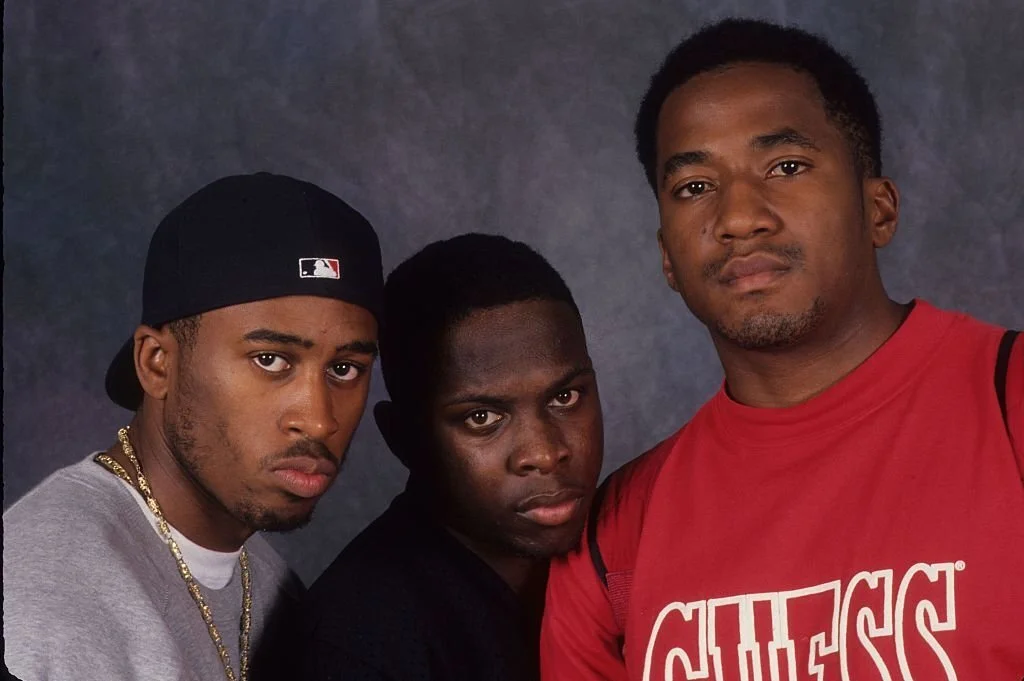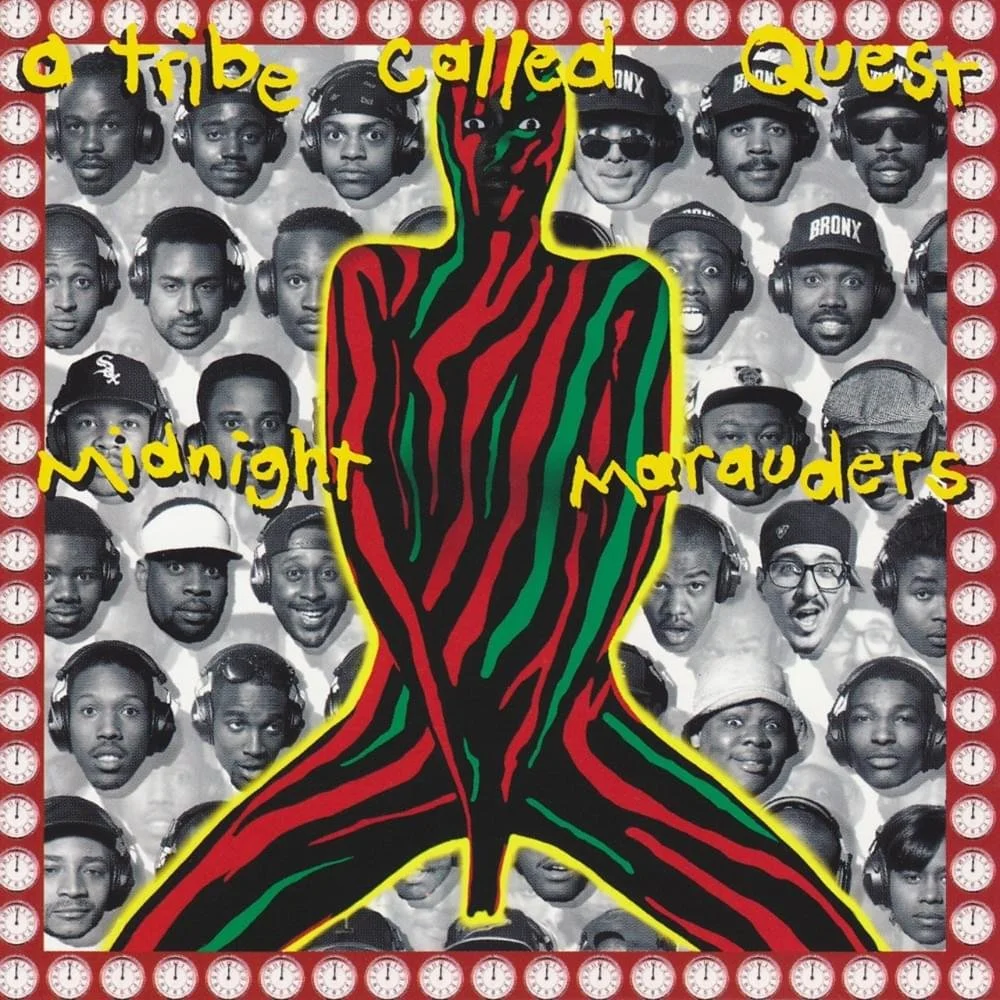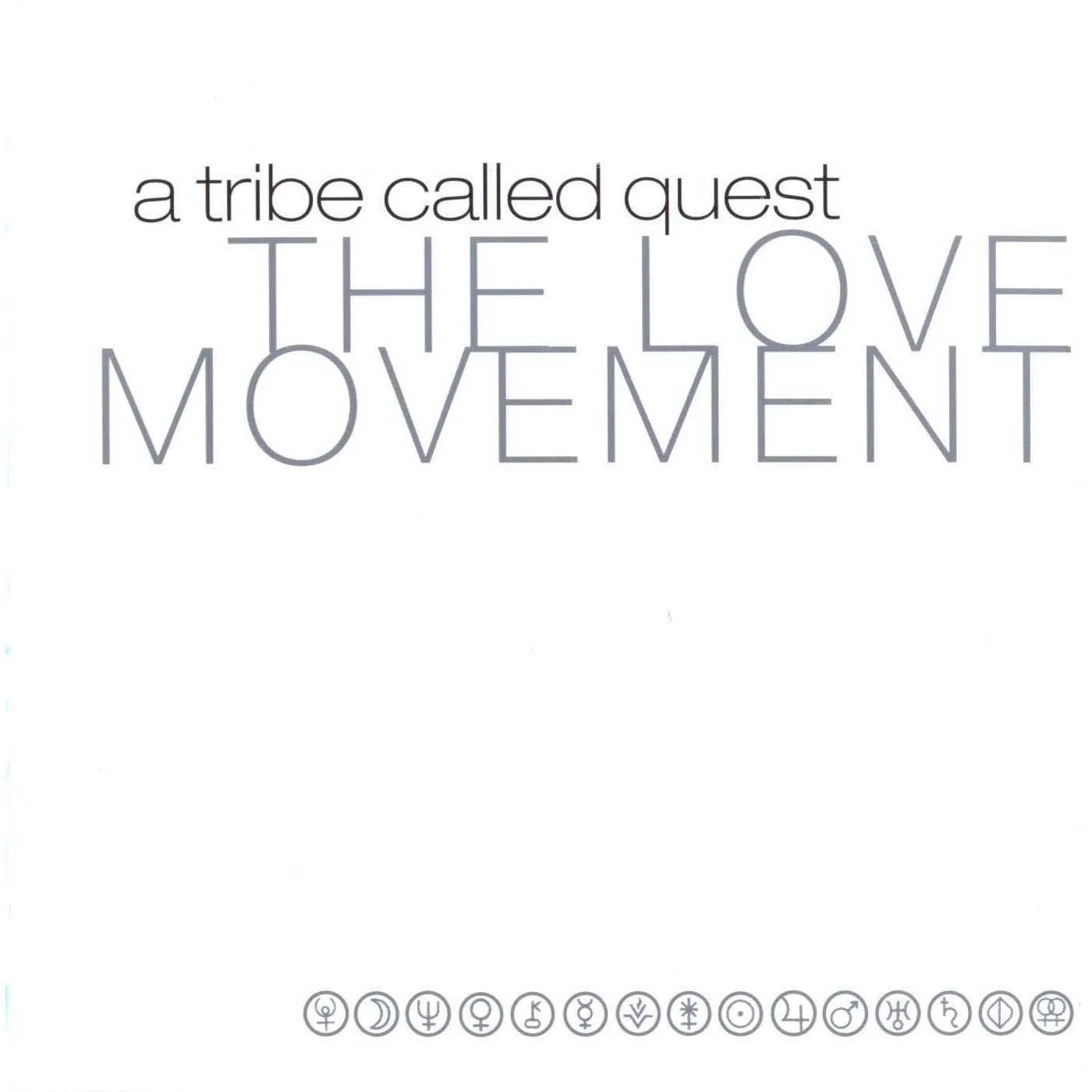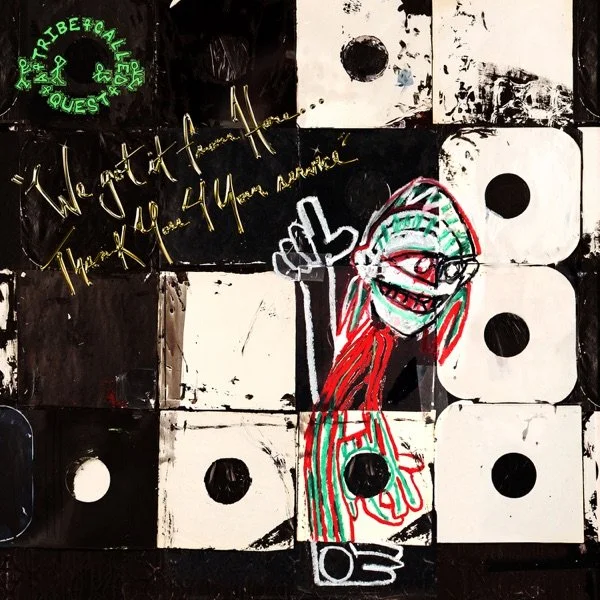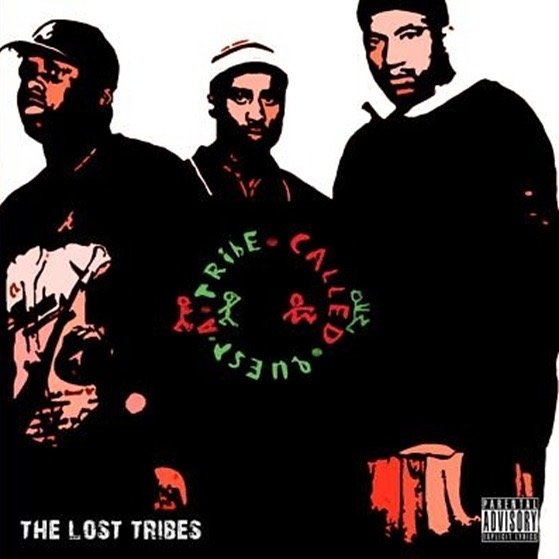The Definitive A Tribe Called Quest Album Guide
From "Clap Your Hands" to "Conrad Tokyo", this is the ultimate guide to A Tribe Called Quest's iconic catalogue as we commemorate hip-hop's 50th birthday.
Pioneers. It's one of the few words that genuinely captures the Queens rap quartet A Tribe Called Quest accurately. In the three decades since their ascent up the hip-hop monolith, the Jive Records group has etched jazz rap into hip-hop canon, provided the building blocks for the mid-1990s neo-soul revolution and raised the bar for MC-producer relationships.
Materialising from the childhood spirits of Jonathan Davis, a.k.a. Q-Tip and the late Malik Taylor, a.k.a Phife Dawg—their friendship was Tribe's driving force. Beatmaker-DJ Ali Shaheed Muhammad and poet-presenter Jarobi White joined the fold for their 1989 12" debut single "Description Of A Fool". The rest was history. Today, The Tribe no longer exists in the mortal realm; they reside in our collective consciousness as soaring pillars of innovation.
So, to celebrate 50 years of hip-hop, The Culture Crypt is examining Linden Boulevard's finest in this album-by-album guide. Is that cool with you? Alright, let's kick it.
People's Instinctive Travels And The Paths of Rhythm
The first one.
Released on April 10th, 1990.
Produced by A Tribe Called Quest.
1990 was a pivotal year for music inside and outside the rap world. We saw Ice Cube split from N.W.A. and become AmeriKKKa's Most Wanted rap bandit. At the same time, alt-rock favourites Sonic Youth filled up a retro six-CD car changer with Goo, and rapping pop star MC Hammer put hurt on the charts with his parachute-propelled "Hammer Pants".
Despite this, few musical stars shined as brightly as Tribe did on People's Instinctive Travels And The Paths of Rhythm. Gracing store shelves on April 10th, 1990 (the same day Public Enemy’s Fear of a Black Planet dropped)—People's Instinctive Travels… is a dizzying, sharp first effort.
Despite the album's production credits citing the group as a whole, Q-Tip handled most of the instrumentation and rapping duties. Utilising pause tapes from his high school days as a template, the album's youthful, kinetic energy engulfs listeners.
Influenced by their then-manager, Kool DJ Red Alert, and Native Tongues peers, the Jungle Brothers and De La Soul, the record kicks off with "Push It Along".
With crunchy drum kicks and smooth, conversationalist flows—the track introduces us to our four rap statesmen guiding us through the album. Unveiling his raspy, animated tone, Phife shows up sporadically across the album—delivering head-turning verses on "Can I Kick It?" and "Mr. Muhammad" in particular.
Despite being one of the best records of its era, the record stumbles as a "group album". Compared to the solid group dynamics of their Native Tongues peers, the album inches towards a solo Q-Tip demo tape rather than adequately demonstrating the group's true strengths.
Nonetheless, we'd be remiss if we didn't mention the show-stopping earworm "Bonita Applebum", the ode to teenage irresponsibility (and spaghetti westerns) "I Left My Wallet In El Segundo" and the jazz-coated scorcher "Luck Of Lucien". People's Instinctive Travels is 14 shots of fun, musical adrenaline that continues to age like fine wine.
The Low End Theory
The best one.
Released on September 24th, 1991.
Produced by A Tribe Called Quest and Skeff Anselm.
If you thought an album that came out the same day as Nirvana's Nevermind and the Red Hot Chili Peppers' Blood Sugar Sex Magik wouldn't be fire, you were greatly mistaken. Released on September 24th, 1991, during the height of one-hit-wonders and gangster rap's attempt at commercial dominance—Tribe didn't look to replicate the magic of their debut. In the immortal words of Q-Tip: "Sophomore jinx? What the fuck is that? I'm going to make The Low End Theory".
The album title has a clever double meaning: referring to the low bass frequencies interwoven throughout the album and the dire status of Black men in America. During the early stages of production, Jarobi abruptly left the group to attend culinary school. With one man down—and various Jarobi verses already recorded—the trio soldiered on and nailed the group dynamic.
Borrowing even more from his parent's record collection, Q-Tip, alongside engineer Bob Power and co-producer Skeff Anselm, crafted a slightly darker record, less entangled in Afrocentricity. Instead, the trio gravitated towards new topics like capitalism ("Everything Is Fair"), jazz rap's fabled origins ("Excursions") and the music biz ("Show Business" and "Check the Rhime"), namely, “Industry rule #4,080—record company people are shady!”
In their 2011 documentary, Beats, Rhymes & Life: The Travels of A Tribe Called Quest, late industry executive, former Jive Records employee and Tribe manager Chris Lighty allegedly had to pry the record from Q-Tip's hands in the fourth quarter, as the trio kept trying to improve the already stellar album. It shows.
Phife and Ali get more creative agency this time around. Album standouts "Jazz (We Got)" and "Buggin' Out" demonstrate the effortless back-and-forth between Tip and Phife—which mirrors two brothers taking turns to show off their Tekken combos on a late-night PlayStation 2 session.
The album closes with perhaps one of Tribe's most celebrated tracks, "Scenario". Linking up with fellow New York hip-hop group Leaders of the New School, this posse cut sees Phife, Charlie Brown, Dinco D, Q-Tip and a then-relatively unknown Busta Rhymes tear up the track. Bellowing like a dungeon dragon, Busta lets listeners, A&Rs and execs know he's got what it takes to be a solo star.
The album's mythos has only grown in stature in the 31 years since The Low End Theory dropped. Sometimes hailed as Tribe's strongest effort, it's easy to see why: a dynamic cocktail of charisma, soul, and warped samples makes The Low End Theory one of hip-hop's most cherished works.
Midnight Marauders
The popular one.
Released on November 9th, 1993.
Produced by A Tribe Called Quest, Skeff Anselm and Large Professor.
Following the success of The Low End Theory, Tribe found their groove, and a winning formula was established. Fans expected album #3 would have thumping bass. Listeners also knew Q-Tip and Phife would be rapping back-to-back like laser gun-wielding '80s action heroes. Finally, it was assumed that Tribe would drop their album alongside fellow music royalty. Fan foretelling was correct. Tribe's third LP was released on November 9th, 1993, the same day as Wu-Tang Clan's seminal debut Enter the Wu-Tang (36 Chambers).
Midnight Marauders is like a Nando's to a British person—it's comforting, quality, and it'll attract a crowd under the right circumstances.
Accompanied by a sci-fi-inspired AI narrator (a 29-year head start over ChatGPT), the album doubles down on jazz but sprinkles in R&B, funk and a light-hearted tone akin to their debut. Crafted as the spiritual successor to "Scenario", the Busta Rhymes-assisted "Oh My God" wows with its wonky, funk-driven bassline, sampling The Whatnauts' 1972 track "Why Can't People Be Colors Too?".
The lyrics are great, too. Phife drops his iconic one-liner, "When's the last time you heard a funky diabetic?" alluding to his type 1 diabetes diagnosis during The Low End Theory press run.
Stadium-filler and Wayans Bros. theme tune "Electric Relaxation" also appears on Midnight Marauders. Enrapturing listeners with mellow guitar licks, a wobbly bassline and an addictive sample loop courtesy of Ronnie Foster's "Mystic Brew"—many call the track Tribe at their best.
Although Q-Tip's always been an accomplished producer and wordsmith, Tip's lyrics are dialled up a notch for Midnight Marauders. He delivers notable standout verses on the nocturnal album closer "God Lives Through" and the jet-setting "Award Tour".
Overall, Midnight Marauders is a great time. On this album, A Tribe Called Quest truly cemented themselves as forces to be reckoned with in hip-hop—allowing each member to splinter off and pursue other endeavours.
Following the LP's success, Phife explored sports entertainment. Ali aided D'Angelo craft his 1995 neo-soul extravaganza Brown Sugar, and Q-Tip became a producer for hire—scattering his instrumentals across the hip-hop sphere. Some of his non-Tribe work includes beats for Nas on his quintessential 1994 album illmatic and Mobb Deep's 1995 sophomore classic, The Infamous. Not bad for an off-season.
Publications like Rolling Stone and Pitchfork cite Midnight Marauders as one of the greatest albums of the 1990s. To this day, fans debate whether this or Low End is better. If someone reminds you that repeated sequels suck, remind them of Midnight Marauders.
Beats, Rhymes And Life
The underrated one.
Released on July 30th, 1996.
Produced by The Ummah [Q-Tip, Ali Shaheed Muhammad, J Dilla] and Rashad Smith.
So, what now? The Tribe had already conquered the lane carved out for them back in 1990 and then some. Come 1996, the rap world was injected with anabolic steroids. With the Native Tongues collective in limbo, warring East and West Coast rap factions aimed at each other in the streets and over wax. Resulting in the untimely death of Tupac Shakur (and The Notorious B.I.G. the following year), 1996 was a transformative time for hip-hop culture.
With Phife no longer residing in New York, the recording process for Beats, Rhymes And Life was more tedious than their past efforts. As a result, Q-Tip's cousin and future Kanye West co-writer, Consequence, was bought in as a rap intern to fill in for Phife. We're not overselling it; Consequence is on seven of the album's 15 tracks.
While things might seem undercooked on the surface, but this album has a secret superpower no Tribe album before could boast: J Dilla. At the time, the late, great Dilla was a Tribe admirer, humble beatmaker-rapper and member of the hip-hop trio Slum Village. Repping the Motor City, Dilla impressed both The Roots' Questlove and Q-Tip with his sample-chopping abilities.
The Slum Village alum was bought into the fold as a member of the production offshoot, The Ummah. Acting as the parallel universe production twin of A Tribe Called Quest, The Ummah would go on to entirely produce Beats, Rhymes And Life and its follow-up.
As a trio, The Ummah would also go on to outsource their beats to Mariah Carey, co-producing her 1997 smash "Honey", Jon B.'s "Cool Relax" and Whitney Houston's "Fine". Context aside, Beats, Rhymes And Life is a moody, hypnotic affair. Crunchy drum kicks? Check. Slick Q-Tip bars? Check.
Incorporating more R&B elements than Midnight Marauders, Beats, Rhymes And Life recruits The Neptunes-adjacent singer Tammy Lucas for their underrated comeback single "1nce Again" and Bad Boy Records' First Lady, Faith Evans for the sombre album closer "Stressed Out".
Dilla's stellar production chops get a chance to shine on "Get A Hold", Consequence also stakes his claim for the fourth (technically fifth) member of The Tribe on "The Jam", and Phife's cartoonish style pierces through on late-album highlight "The Hop"—likening himself to OJ Simpson as he "stabs up the track", and raps about Lisa “Left Eye" Lopes' arson case. Not for the faint of heart.
While not as beloved as its predecessors, Beats, Rhymes, And Life still pushed Tribe's legacy forward. It's like coffee to a lethargic person. Even if it’s not the best, they'll still devour it—Dilla beats, caffeine'n all.
The Love Movement
The breakup one.
Released on September 29th, 1998.
Produced by The Ummah and Bay-Lloyd.
Unlike the rocky ground on which Beats, Rhymes And Life sat upon, 1998 was an excellent year for hip-hop. With Jay-Z, OutKast, Lauryn Hill, Master P and DMX ruling the charts, the genre sought to heal itself after the past two years of turmoil.
1998 wasn't problem-free, though. In early 1998, a house fire at Q-Tip's home destroyed many of the original recordings for the fifth Tribe album alongside Q-Tip's extensive record collection. Still, The Tribe and The Ummah resumed work on what would become The Love Movement.
About a month before its intended release, A Tribe Called Quest announced that The Love Movement would be their last album. The official reasoning given for the group's breakup is scattershot at best. The PR response cited "label frustrations". However, industry murmurs and their 2011 documentary highlighted this era of The Tribe mythology, indicating their breakup resulted from rising tensions between Q-Tip and Phife. Q-Tip felt like Phife wasn't pulling his weight musically. Phife felt like Q-Tip was overly controlling regarding the group's decision-making. As a result, their brotherly disagreements reached a boiling point.
Despite the negative press, The Love Movement is quite the mellow, optimistic listen. Further venturing into abstract neo-soul and buttery R&B, the rap trio bring back the fun found in their earlier work. Leading single "Find a Way" might be one of The Tribe's best, with a Dilla-christened groove and head-nod-worthy kicks. Equally, "Like It Like That" sounds retro in all the best ways, with an instrumental backdrop that doubles as a silky wanderlust.
Ali Shaheed Muhammad and guitarist Spanky shine on the standout jazz number "4 Moms", and old friend Busta Rhymes teams up with Mr. Muddy Waters himself, Redman, for the sharper-edged heater "Steppin' It Up". A Black Star-era Mos Def also makes a noteworthy appearance on the closer "Rock Rock Y'all" alongside Jane Doe, Punchline and Wordsworth.
Phife also gets to flex his Trinidadian roots on his solo adventure "His Name Is Mutty Ranks", while Q-Tip and Noreaga trade bars on the funk-laden "Give Me". Equally, tracks 16 through 21 feature rare B-sides, unreleased tracks and remixes to give fans a sense of finality. Yeah, the redux of "Jazz (We've Got)" is that good.
Fans often cite The Love Movement as their least favourite Tribe album. While it has shortcomings, the album is significantly better than what critics gave it credit for. Until 2016, it was the final Tribe album, and the drama surrounding it must've tempered expectations. There's not an overarching concept, narrative or 'deep' message. At its core, The Love Movement is an R&B-soaked alt-rap breeze.
We Got It from Here… Thank You 4 Your Service
The grand finale.
Released on November 11th 2016.
Produced by Q-Tip and Blair Wells.
This album shouldn't exist. It's a miracle it does, to be honest. Over the years, the Tribe temporarily reunited for the odd show or two, often in the name of Phife's deteriorating health due to his diabetes and subsequent medical expenses.
In 2015, the quartet hit the press circuit for People's Instinctive Travels 25th anniversary and subsequent re-release. On November 13th 2015, the group performed on The Tonight Show Starring Jimmy Fallon and felt a sudden surge of inspiration. Putting aside any prior squabbles, the group secretly gathered to record a new five-song EP, as they didn't believe Phife was truly well enough for an entire album.
Well, the Funky Diabetic got into album mode alongside Q-Tip and Jarobi—who re-joined the group for the first time since their debut. Sadly, Ali Shaheed Muhammad could not co-produce alongside his beat-bound pal Q-Tip as he was handling Marvel's Luke Cage soundtrack.
Still, Q-Tip, Phife, and Jarobi enlisted their most expansive guest roster in Kendrick Lamar, Anderson .Paak, Kanye West, Yebba, André 3000, Elton John, Talib Kweli, Jack White, Floetry's Marsha Ambrosius, Consequence, and Busta Rhymes for their first album in 18 years, We Got It from Here… Thank You 4 Your Service.
Sadly, as the album cycle neared completion, Malik "Phife" Taylor passed away on March 22nd, 2016, due to complications with his diabetes.
Admittedly, this album is hard for me to write about. I remember the day this was announced vividly. I dropped my phone in grief and confusion. My throat ceased up, and I scoured news articles for more information.
As a lifelong Tribe fan up until that point, Phife's death was a terrifying mirror of my own life. Phife was my hero. As someone living with type 1 diabetes since the age of eight, Phife, in particular, was always a beacon of inspiration to me. He showed me that despite all of the injections, low blood sugars and medical struggles, diabetes could not and would not stop you. Whether you have a chronic illness or not, you can still achieve anything you want. Cliché as it sounds, Phife made me realise diabetes wasn't a hindrance—it was a superpower. Without Malik "Phife" Taylor, you wouldn't be reading this album guide.
To the general public, the new Tribe album was a genuine mystery. To our delight, We Got It from Here… Thank You 4 Your Service was announced in late 2016. Admittedly, a lot of the fandom and I were sceptical. Posthumous albums didn't have the best track record, after all.
The album has a Side A and B, splitting the music into two halves like a vintage LP. Almost entirely produced by Q-Tip once again, the record starts with "The Space Program". The album opener is an ace universe-pondering thesis masquerading in a song-shaped disguise. Stepping back into a conscious mindset, "The Space Program" is equally weighted in real-world social unrest and dystopian storytelling. Exploring the socio-political climate and racism circa 2016, seeing Q-Tip, Jarobi and Phife exchange bars on one track was truly the stuff of Native Tongues fan fiction.
Late album gem "Conrad Tokyo" sees Phife and Kendrick Lamar go back and forth over a blues-tinged backdrop. "Mobius" sees Side B kick off with a stone-cold verse by Consequence rapping like the rent's due before Busta Rhymes comes through and detonates verbal warheads over the track.
Releasing to both fan and critical acclaim, We Got It from Here… Thank You 4 Your Service is a watershed album for A Tribe Called Quest and the proper send-off they deserve. Made in secret and shackled by tragedy—it's a miracle that the album sounds as polished and focused as it does. What a finale.
Bonus Beats
B-sides for dessert.
Released on March 15th, 2006 in Japan only.
It's a compilation record—the production credits are too crazy.
Here are your B-sides. In 2006, A Tribe Called Quest released a Japan-only compilation disc called The Lost Tribes featuring their remixes, rarities, and odd ends that didn't even make it to The Love Movement. Notable cuts on this 2006 compilation include "The Shit", featuring J Dilla rapping alongside The Tribe.
While this track can't officially be dated, it could've been either a Love Movement leftover or one of the album's original tracks recorded before Q-Tip's house fire—it's unclear. We all know that the track also popped up on a 1998 Funkmaster Flex mixtape.
The 2003 Erykah Badu-assisted single "ICU (Doin' It)" also finds a home on The Lost Tribes. The reunion track was initially set to be featured on the unreleased Violator album V3: The Good, the Bad & the Ugly. If you're a die-hard fan, you can also seek out Hits, Rarities & Remixes and 1997's The Jam EP too for additional Tribe-based jewels.
Stream A Tribe Called Quest below:


